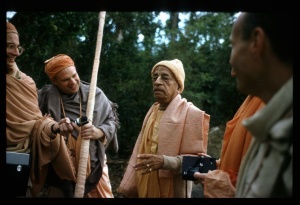SB 4.29.12: Difference between revisions
m (1 revision(s)) |
(Vanibot #0018 edit: make synonym terms in Sanskrit italic in SB - Vanisource) |
||
| Line 1: | Line 1: | ||
{{info | {{info | ||
|speaker= | |speaker=Nārada Muni | ||
|listener=King | |listener=King Prācīnabarhiṣat | ||
}} | }} | ||
[[Category:Srimad-Bhagavatam - Canto 04 Chapter 29]] | |||
[[Category:Bhagavatam Verses Spoken by Narada Muni - Vanisource|042912]] | |||
<div style="float:left">'''[[Srimad-Bhagavatam]] - [[SB 4|Fourth Canto]] - [[SB 4.29: Talks Between Narada and King Pracinabarhi|Chapter 29: Talks Between Nārada and King Prācīnabarhi]]'''</div> | |||
<div style="float:right">[[File:Go-previous.png|link=SB 4.29.11]] '''[[SB 4.29.11]] - [[SB 4.29.13]]''' [[File:Go-next.png|link=SB 4.29.13]]</div> | |||
{{RandomImage}} | |||
==== TEXT 12 ==== | ==== TEXT 12 ==== | ||
<div | <div class="verse"> | ||
āpaṇo vyavahāro 'tra | :āpaṇo vyavahāro 'tra | ||
citram andho bahūdanam | :citram andho bahūdanam | ||
pitṛhūr dakṣiṇaḥ karṇa | :pitṛhūr dakṣiṇaḥ karṇa | ||
uttaro devahūḥ smṛtaḥ | :uttaro devahūḥ smṛtaḥ | ||
</div> | </div> | ||
| Line 16: | Line 22: | ||
==== SYNONYMS ==== | ==== SYNONYMS ==== | ||
<div | <div class="synonyms"> | ||
''āpaṇaḥ''—named Āpaṇa; ''vyavahāraḥ''—business of the tongue; ''atra''—here; ''citram''—of all varieties; ''andhaḥ''—eatables; ''bahūdanam''—named Bahūdana; ''pitṛ-hūḥ''—named Pitṛhū; ''dakṣiṇaḥ''—right; ''karṇaḥ''—ear; ''uttaraḥ''—left; ''deva-hūḥ''—Devahū; ''smṛtaḥ''—is called. | |||
</div> | </div> | ||
| Line 23: | Line 29: | ||
==== TRANSLATION ==== | ==== TRANSLATION ==== | ||
<div | <div class="translation"> | ||
The city called Āpaṇa represents engagement of the tongue in speech, and Bahūdana is the variety of foodstuffs. The right ear is called the gate of Pitṛhū, and the left ear is called the gate of Devahū. | The city called Āpaṇa represents engagement of the tongue in speech, and Bahūdana is the variety of foodstuffs. The right ear is called the gate of Pitṛhū, and the left ear is called the gate of Devahū. | ||
</div> | </div> | ||
__NOTOC__ | |||
<div style="float:right; clear:both;">[[File:Go-previous.png|link=SB 4.29.11]] '''[[SB 4.29.11]] - [[SB 4.29.13]]''' [[File:Go-next.png|link=SB 4.29.13]]</div> | |||
__NOTOC__ | |||
__NOEDITSECTION__ | |||
Revision as of 23:56, 30 November 2017

His Divine Grace
A.C. Bhaktivedanta Swami Prabhupada
A.C. Bhaktivedanta Swami Prabhupada
TEXT 12
- āpaṇo vyavahāro 'tra
- citram andho bahūdanam
- pitṛhūr dakṣiṇaḥ karṇa
- uttaro devahūḥ smṛtaḥ
SYNONYMS
āpaṇaḥ—named Āpaṇa; vyavahāraḥ—business of the tongue; atra—here; citram—of all varieties; andhaḥ—eatables; bahūdanam—named Bahūdana; pitṛ-hūḥ—named Pitṛhū; dakṣiṇaḥ—right; karṇaḥ—ear; uttaraḥ—left; deva-hūḥ—Devahū; smṛtaḥ—is called.
TRANSLATION
The city called Āpaṇa represents engagement of the tongue in speech, and Bahūdana is the variety of foodstuffs. The right ear is called the gate of Pitṛhū, and the left ear is called the gate of Devahū.